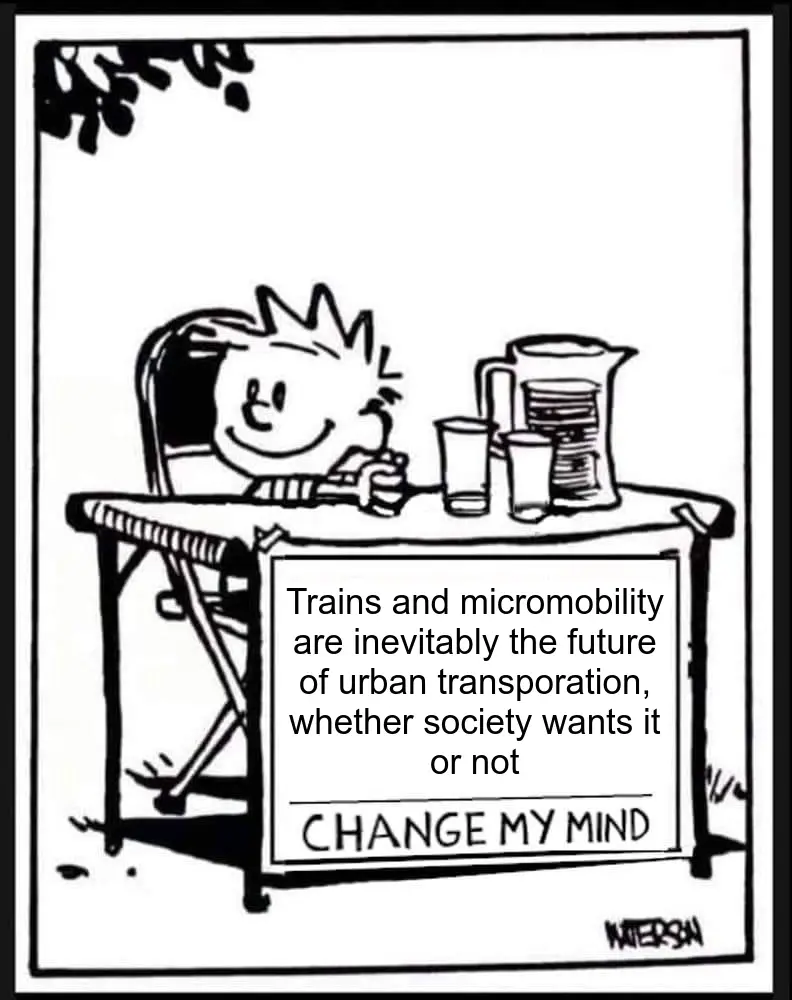Fuck Cars
A place to discuss problems of car centric infrastructure or how it hurts us all. Let's explore the bad world of Cars!
Rules
1. Be Civil
You may not agree on ideas, but please do not be needlessly rude or insulting to other people in this community.
2. No hate speech
Don't discriminate or disparage people on the basis of sex, gender, race, ethnicity, nationality, religion, or sexuality.
3. Don't harass people
Don't follow people you disagree with into multiple threads or into PMs to insult, disparage, or otherwise attack them. And certainly don't doxx any non-public figures.
4. Stay on topic
This community is about cars, their externalities in society, car-dependency, and solutions to these.
5. No reposts
Do not repost content that has already been posted in this community.
Moderator discretion will be used to judge reports with regard to the above rules.
Posting Guidelines
In the absence of a flair system on lemmy yet, let’s try to make it easier to scan through posts by type in here by using tags:
- [meta] for discussions/suggestions about this community itself
- [article] for news articles
- [blog] for any blog-style content
- [video] for video resources
- [academic] for academic studies and sources
- [discussion] for text post questions, rants, and/or discussions
- [meme] for memes
- [image] for any non-meme images
- [misc] for anything that doesn’t fall cleanly into any of the other categories
Recommended communities:
view the rest of the comments

But that's an issue with capitalism, not the technology itself. Roads and high(motor)ways are very heavily subsidized and tax funded, while rail in the UK is largely privatized. It's just a sign of what is being prioritized by government and/or society, which is cars in this case. There are plenty of places where public transit is free or at least the definitive cheapest way to travel, also due to government funding.
Trains are directly linked to capitalism, not sure what you are getting at here. They require incredible amounts of capital to build, and incredible amounts of money to operate. They enabled the industrialization.
Communist countries also, in fact, received their trains from capitalist countries. Russia had hardly any before the US started supplying them during the industrialization process by Albert Kahn and associates.
The most train centric countries in the world are also the most capitalist. Whether that's state run capitalism or private, state run generally provides more passenger rail service. However, Japan is an exception there with its JR Rail.
"The most train centric countries in the world are also the most capitalist."
That's because most countries in the world are capitalist mate.
Also, if you acknowledge that JR Rail is not capitalist, even if China is defined as a state capitalist country you still have to acknowledge that the rail system itself is not capitalist (it is also state owned like JR rail).
The fact is once profit is prioritised in something like mass public transportation, it starts to go to shit. That's why American rail is so shit, that's why every place in the UK has shit public transportation after privitisation bar a few cities like Nottingham, London and Manchester, and why it's so expensive to get from city to city. Countries with largely state owned public transport tend to do better with their public transport.
No, I was actually pointing out that JR rail is not a state run passenger rail corporation, unlike Amtrak in the United States, DB in Germany and SNCF in France. It's fully private and is only profitable due to Japan's extreme population density and narrow shinkansen corridor between Tokyo and Osaka.
It is in fact fully privatized, or "capitalist."